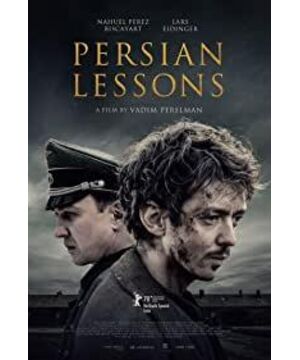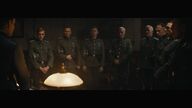There are so many movies about the brutal persecution of Jews in concentration camps by the Nazis that I can name a few of them. I won't lift it up, let's take care of your own mother. But for me, the first movie to know how Germans treated Jews during World War II was a movie called Cassandra Bridge. The general plot is: a terrorist who was infected with a laboratory virus suddenly broke into a train, and many people were infected one after another. In order to ensure the safety of more people, the train cars and windows were sealed, and they left their destination and drove to another place. In this movie, I heard the name Auschwitz for the first time, and I didn't know what it was at the time, but I was very impressed by the horror on the expressions of some old people when they heard the name. It is time to memorize world history books in high school after learning more about this phrase.
The story told in "Lessons in Persian" is very different from the previous one. It does not deliberately show the painful scenes of the Jews, nor does it exaggerate the brutal persecution of the Germans, but tells a story that looks like a game of cat and mouse. And this game of capture and escape not only happened to male No. 1 and No. 2, but also between officers and officers in the German barracks, as well as between officers and soldiers, between male soldiers and female soldiers, and between female soldiers and female soldiers. We can look at the various gods of this game one by one, and if we explore it clearly, we will be able to understand why the male protagonist can escape. This is both an accidental event and an inevitable result.
Male No. 1 and Mr. Captain Chef. Their cat-and-mouse game is the main thread and focus of the entire film. The male protagonist must be a rat, and the chef is a cat. But the paradox is that the "rat", the male protagonist, has always prevailed among the seemingly disparate opponents. why? First of all, the male protagonist in the role of "rat" has always been suppressed, persecuted and tortured, but he has always been in control of the development of the situation. At the beginning of the movie, he exchanged half a piece of bread for the first edition of the Persian book, which is said to be worth thousands of pieces of bread, and then panicked that he was a Persian and successfully persuaded the German soldiers to take it to the chef, and relying on the book Persian I got the first letter from the chef because of the book, the word "father" that I am using now and the word "mother" made up on the spot. To be honest, I was blinded by him when I saw it. I really thought he had Half Persian ancestry. Not to mention the chef who has always wanted to learn Persian to open a restaurant. After that, although there were occasional incidents of saying that Leozui was beaten to death and sent to a stone quarry to do heavy physical work, that only happened once, and it was this experience that made Mr. Chef trust him even more. , for food, and even bring food to the dormitory for roommates to eat. In fact, the male protagonist himself does not know, the imaginary Persian language has penetrated into his subconscious, and he uses this language to speak nonsense. His unconsciousness has deceived himself, how could Mr. Chef, who has a round face and claims to be smarter than his subordinates, refuse to obey. Interlude, I really admire the male protagonist's language creation ability and memory.
The book is back to normal. After this turning point, the hero ushered in his most brilliant moment in the movie: when he was walking back from the farm to the camp, the soldier who brought him back from the execution ground to change the cans said that he would be killed immediately, but he ignored it. Walking into the camp, he threw his handsome back to the soldiers, but the soldiers didn't dare to let go. This section is like Jerry in "Tom and Jerry" with the support of the old dog, and he squatted with Tomdo without fear.
The big dog of the male protagonist is Mr. Chef. At this point, in this game, the cat chasing the mouse has reversed, and the mouse - the male protagonist is already leading the cat - Mr. Chef's nose is walking away. Afterwards, the chef talked with him late at night, talked bitterly about his family history, pulled him out of the transfer (actually executed) team, and even took Lintao with him to save him from being killed before he left. This relationship should be very tough. Some people think that the relationship between the two can be interpreted from the perspective of homosexuality. If it is possible, then background music can be played at this time: if this is not love...
But I think it should be the male protagonist who made the fire of Chef's Tehran dream more and more prosperous. He is the one who added the firewood, and he is also the only person Chef who can tell his dreams with confidence. He is not only a language teacher, but also a witness and appreciator of his progress, and a booster of his own dreams. He became an indispensable person in the heart of the chef. It is worth noting that doing this was not what he thought, and he did not expect it. So until the end of the movie, when he was accidentally brought out to freedom, he inexplicably asked the chef why he rescued him.
Secondly, the captain who is in the role of "cat", even if he is always in a position of power over the male protagonist, he has always had this right. He also said that if he dared to lie to him, he would make the male protagonist unable to eat and walk away, but He never used it. Even when he suspected that the male protagonist lied to him, he only punched and kicked, but did not kill the male protagonist like his subordinates naturally raised their guns and slammed the male protagonist's roommate. The reason for such a situation, I think, is because he is a cook at heart, not a soldier who actively kills. This is a chef with a dream of opening a restaurant in Tehran. Don't look at him showing off his power in front of his hands, but he is actually a catering practitioner who wants to devote himself to the culinary career. He didn't care how the Germans were fighting, how the Jews were slaughtered and abused, and he didn't care about the love of his female subordinates. His head was full of Tehran and small restaurants, and only the male lead could help him realize this wish. When he was learning Persian here, he sincerely sighed: This language is so beautiful, and he even wrote a poem in the so-called Persian he learned. What the hell! I have studied foreign languages for so many years, and I have learned more than one, but I have never felt that a foreign language is so beautiful that I have the urge to write poetry, let alone experiment. But the chef is obsessed to that extent. Perhaps because of his love for the house and the Uganda, the dream of opening a restaurant made him fervently fall in love with the Persian class, the forged language.
The chef also had his moment of brilliance, when he confidently said "Persian" at customs. Passing through this level will lead you to the place you dream of. The ecstasy is needless to say, but the gentleman's demeanor must be maintained. Restraining his inner excitement, he skillfully speaks "Persian", which has been practiced thousands of times, and it feels as if the dishes are fried and served on the table, waiting for the guests to appreciate them. However, the contrast between the square-faced chef in Dige and the skinny, thin-faced Tehran customs guy was too strong. I admit, I was holding back my laughter when I saw this, and wanted to hold it for a few more minutes, but when I saw him being pushed to the ground and shouting loudly, the crowing-like laughter still burst out involuntarily. . This ironic style is too unbearable. The chef, who was lying on the ground and struggling, finally realized that he had been tricked, and the trick was so thorough, and he was so willing. There's nothing pitiful to be deceived into this, after all, he used the food he made to feed the executioners, and he couldn't escape the murder of the Jews anyway.
The reason why this "cat" was finally carried on the "rat" is because the male protagonist is too creative. He even speaks "Persian" in his dreams, and the desire to survive turned the subconscious in the dark. All inspired. To achieve this in "Inception" has to use artificial psychological hints, but he has completed such a super difficult operation by himself, which is really eye-opening, and at the same time, it is also more than sigh-wanting to live , it's so hard to make a horse. On the other hand, the chef is too persistent. From a psychological point of view, a person who is too obsessed with one thing often ignores many important plots and clues. Things that are obvious to others may be lost in the party. The chef was obsessed with learning Persian well and going to Tehran to open a restaurant (actually to his brother) until he was exposed. In order to realize this dream, he can threaten his superiors, reprimand his subordinates, use it for public and private purposes, operate illegally, and even draw guns at the officers of the escort team. This behavior seems to be able to intertextualize the above-mentioned point of view of the chef's unique feeling for the big-eyed brother.
Of course, the big-eyed brother finally escaped thanks to several other contenders for the Oscar for best supporting roles in the cat-and-mouse game. The unrequited female soldier who was dismissed as a writer (the words were really ugly), another female soldier who had a crush on the soldier, etc. In fact, the relationship between them is actually similar to that of Du Lala's promotion, but their open and secret battles have consumed internal resources and caused everyone's attention to be deviated, which just gave the male protagonist many chances to survive. So these guys are the chef's pig teammates. Another thing that must be written is the two Italian brothers who were caught. The male protagonist moved the older brother by smuggling food for the injured mute younger brother. He repaid the love of the male lead with his own life. The male protagonist is also unequivocal, resolutely changing clothes with the dumb brother and wanting to die for him. Of course, he was eventually lifted out and miraculously survived.
It seems that many things are accidental, such as accidentally exchanging bread for a Persian book, accidentally meeting a chef who wants to learn Persian, accidentally saying "Persian" in a dream, accidentally saving people, accidentally being rescued, etc. , but if you think about it, it's bound to happen. If the soldier wants to earn 10 boxes of canned food, he will believe the male protagonist's nonsense. If he wants to get the remaining 8 and canned food, he will inform the chef. If he wants to pick up girls, he will try to trick the male protagonist. The female soldier who was embarrassed with the soldier was transferred to the front line. In order to keep his little secret, the colonel turned a blind eye to the chef and so on. These seemingly accidental things are actually out of selfishness, and it is the "palace fighting" between them that gives the male protagonist a lot of respite.
The big-eyed brother's escape was accidental and inevitable. But this experience cannot be replicated. The requirements are too high, the most important thing is to have a pig head chef who wants to learn Persian. At the end of the movie, when faced with the question of "Why I came out", the chef said that he didn't want to lose 20 boxes of canned food. We can think of the German officers as keeping their promises, like the officer in Ball of Suisse who blocks everyone from getting through: I will do what I promise. So, can we also understand that the German military officer is grateful to the promoter of his dream as he is now running for a new life? Or, is it that he is condescending to give the big-eyed brother a small life? Or... think too much!
Big Eyed Brother created a large number of "Persian" words with the initials of the prisoners' surnames and first names. Although this was a last resort for him to survive, he indirectly remembered the names that were burned. On the one hand, those people saved him and let him live; on the other hand, he also remembered those who were killed in his own way and let them live in another way. Really escaped him, remember thousands of people.
The film is dark and depressing. But even if the environment is cruel, goodness will still reveal a trace of light in the dark, even if it is small and faint, but it is enough to make the viewers feel hope.
View more about Persian Lessons reviews











